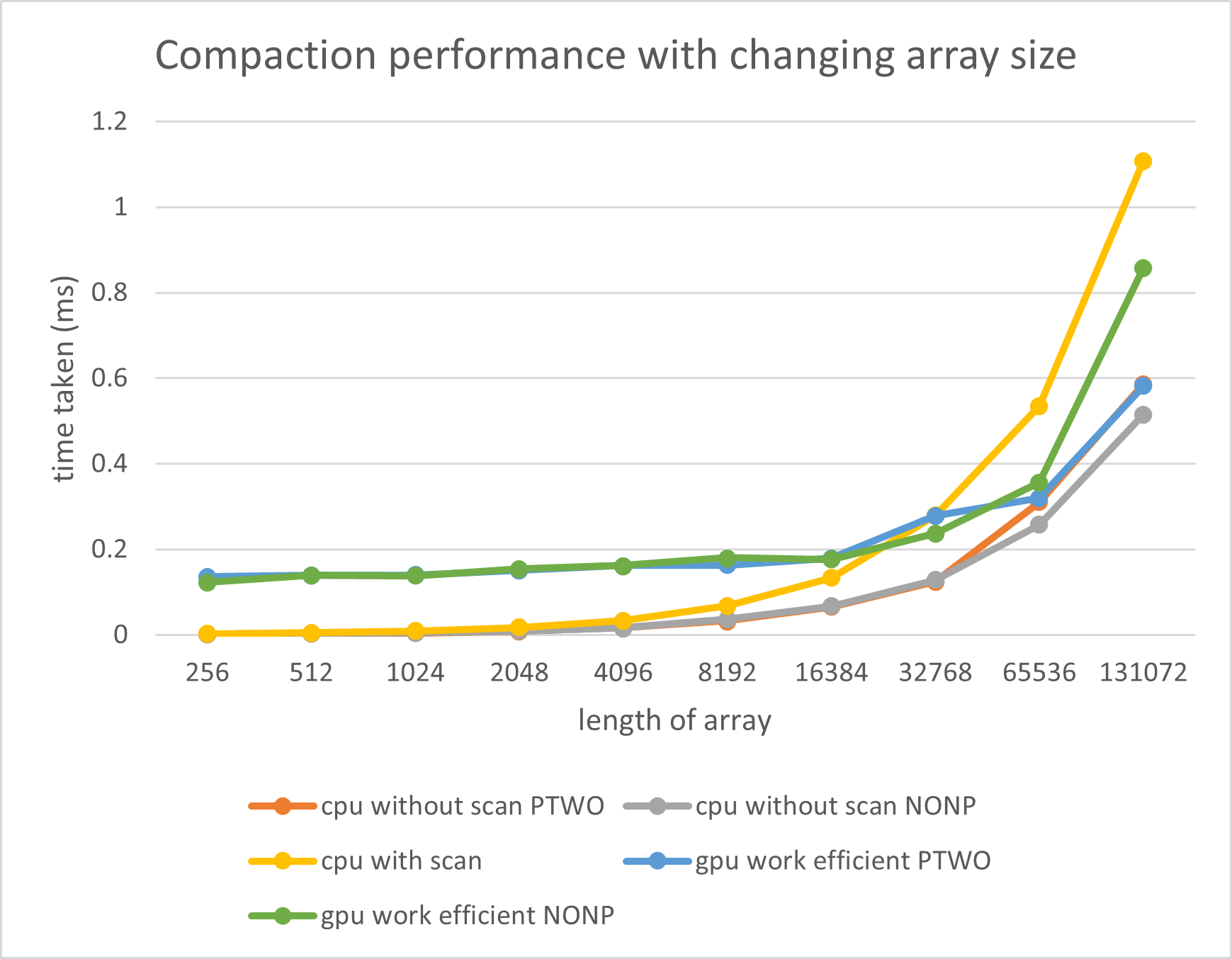University of Pennsylvania, CIS 565: GPU Programming and Architecture, Project 2
Beini Gu
- LinkedIn, personal website, twitter, etc.
- Tested on: Windows 10, AMD Ryzen 7 3700X 8-Core Processor 3.59 GHz 16GB, GTX 2060
- Implementation of scan and stream compaction algorithms that runs parallel on GPU
- comparison between GPU and CPU performance on same stream compaction jobs.
- TODO later: shared memory optimization
- Runtime Output on array size 65536 (
$2^{14}$ ) (See Appendix)
- For scan, GPU computation I implemented lags behind CPU for all ranges of data. There is no clear difference between array size power of two or not. Since for CPU, the non-power-of-two array is just three elements less than its next-power-of-two. For GPU computation, we pad non-power-of-two arrays to power-of-twos.
- For a smaller length of the array, GPU computation lags behind all CPU computation. But for larger length of array, GPU computation becomes faster than stream compaction using "CPU with scan".
- Scan for CPU is not a good method since it does extra work computing prefix sum, etc while the CPU can just go through the entire array once for checking non-zeros (CPU without scan).
- The most significant reason is because all computation takes use of the global memory in the GPU. Getting data from global memory is a very costly operation on GPU computation.
- All the scan kernels involve parallel reduction algorithm which is not optimized for memory accessing. It's constantly accessing interleaved data which keep a lot of warps active. One way of optimizing is to use warp partitioning to retire warps early and to reduce number of divergent warps.
****************
** SCAN TESTS **
****************
[ 48 1 39 13 20 5 2 43 45 38 7 12 26 ... 9 0 ]
==== cpu scan, power-of-two ====
elapsed time: 0.0315ms (std::chrono Measured)
[ 0 48 49 88 101 121 126 128 171 216 254 261 273 ... 400910 400919 ]
==== cpu scan, non-power-of-two ====
elapsed time: 0.0314ms (std::chrono Measured)
[ 0 48 49 88 101 121 126 128 171 216 254 261 273 ... 400871 400878 ]
passed
==== naive scan, power-of-two ====
elapsed time: 0.075776ms (CUDA Measured)
[ 0 48 49 88 101 121 126 128 171 216 254 261 273 ... 400910 400919 ]
passed
==== naive scan, non-power-of-two ====
elapsed time: 0.075776ms (CUDA Measured)
[ 0 48 49 88 101 121 126 128 171 216 254 261 273 ... 0 0 ]
passed
==== work-efficient scan, power-of-two ====
elapsed time: 0.079904ms (CUDA Measured)
[ 0 48 49 88 101 121 126 128 171 216 254 261 273 ... 400910 400919 ]
passed
==== work-efficient scan, non-power-of-two ====
elapsed time: 0.070592ms (CUDA Measured)
[ 0 48 49 88 101 121 126 128 171 216 254 261 273 ... 400871 400878 ]
passed
==== thrust scan, power-of-two ====
elapsed time: 0.061312ms (CUDA Measured)
[ 0 48 49 88 101 121 126 128 171 216 254 261 273 ... 400910 400919 ]
passed
==== thrust scan, non-power-of-two ====
elapsed time: 0.046496ms (CUDA Measured)
[ 0 48 49 88 101 121 126 128 171 216 254 261 273 ... 400871 400878 ]
passed
*****************************
** STREAM COMPACTION TESTS **
*****************************
[ 3 0 0 3 0 1 0 3 2 3 1 2 0 ... 3 0 ]
==== cpu compact without scan, power-of-two ====
elapsed time: 0.0326ms (std::chrono Measured)
[ 3 3 1 3 2 3 1 2 3 2 3 3 1 ... 1 3 ]
passed
==== cpu compact without scan, non-power-of-two ====
elapsed time: 0.0395ms (std::chrono Measured)
[ 3 3 1 3 2 3 1 2 3 2 3 3 1 ... 1 2 ]
passed
==== cpu compact with scan ====
elapsed time: 0.0614ms (std::chrono Measured)
[ 3 3 1 3 2 3 1 2 3 2 3 3 1 ... 1 3 ]
passed
==== work-efficient compact, power-of-two ====
elapsed time: 0.149408ms (CUDA Measured)
[ 3 3 1 3 2 3 1 2 3 2 3 3 1 ... 1 3 ]
passed
==== work-efficient compact, non-power-of-two ====
elapsed time: 0.128736ms (CUDA Measured)
[ 3 3 1 3 2 3 1 2 3 2 3 3 1 ... 1 2 ]
passed
Press any key to continue . . .

